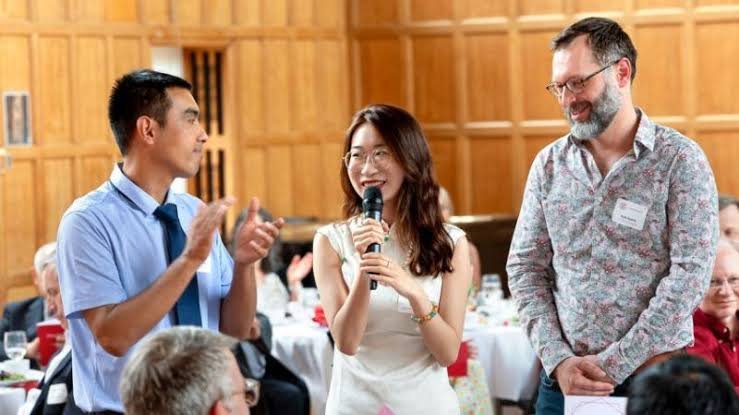Yujia zhang scholar cornell is an esteemed scholar who has made significant contributions to the academic community, particularly at Cornell University. Her expertise spans various fields, including computational imaging, signal processing, and artificial intelligence (AI). With a strong focus on interdisciplinary research, Zhang has developed innovative approaches to address complex problems, and her work has been recognized by the academic and research communities alike.
In this article, we will explore yujia zhang scholar cornell background, academic achievements, key research areas, and her contributions to Cornell University and beyond.
Early Life and Educational Background
Yujia zhang scholar cornell journey into academia began with a passion for mathematics and computer science. From a young age, she displayed an aptitude for problem-solving and a keen interest in understanding how technology can be leveraged to improve various aspects of life. Zhang pursued her undergraduate studies in electrical engineering, where she developed a strong foundation in signal processing and computational methods.
Following her undergraduate studies, Zhang continued her academic pursuits with a master’s degree in electrical engineering, further honing her skills in computational imaging and AI. Her academic excellence and curiosity led her to pursue a Ph.D. at Cornell University, where she specialized in signal processing and machine learning, with a focus on medical imaging applications. Zhang’s doctoral research was highly regarded, and her work on developing innovative imaging techniques set the stage for her future research career.
Academic Career at yujia zhang scholar cornell University
Yujia zhang scholar cornell university has been instrumental in shaping her academic career. As a faculty member at Cornell, she has contributed to both teaching and research, mentoring the next generation of scholars while advancing her own research agenda. Zhang’s work at Cornell has earned her numerous accolades and funding from prestigious organizations, allowing her to build a robust research group focused on solving interdisciplinary problems at the intersection of signal processing, machine learning, and imaging technologies.
Research Focus Areas
Yujia Zhang’s research interests are diverse and interdisciplinary, with a primary focus on computational imaging, signal processing, machine learning, and medical imaging. Her work seeks to address some of the most pressing challenges in these fields by developing algorithms and techniques that push the boundaries of current technological capabilities. Below are some of her key research areas:
1. Computational Imaging
One of yujia zhang scholar cornell primary areas of expertise is computational imaging, a field that involves using advanced algorithms to reconstruct images from raw data captured by sensors. Computational imaging has applications in numerous areas, including medical imaging, photography, and microscopy. Zhang’s work in this field has focused on improving the quality and resolution of images, even when working with limited or noisy data.
Her innovative approaches to computational imaging have been widely recognized, particularly for their ability to enhance imaging systems in medical applications, such as MRI and CT scans. Zhang’s work has improved the accuracy of these imaging techniques, enabling better diagnoses and treatment planning for patients.
2. Signal Processing
Signal processing is at the heart of Zhang’s research, and her work in this area has been groundbreaking. She has developed novel signal processing algorithms that allow for more efficient data analysis and interpretation. In particular, Zhang has worked on developing algorithms that can handle large, complex datasets, which are common in fields such as medical imaging and remote sensing.
Her contributions to signal processing have not only advanced theoretical knowledge in the field but have also had practical implications. Zhang’s work has been applied in areas such as radar systems, wireless communications, and audio signal processing.
3. Machine Learning and Artificial Intelligence
Zhang has also made significant strides in the field of machine learning and AI, particularly in how these technologies can be applied to improve imaging and signal processing techniques. Her research has explored the use of deep learning algorithms to enhance image reconstruction and data analysis, making it possible to extract more information from imaging systems.
One of the key contributions of Zhang’s work in this area is the development of AI models that can learn from limited data. This is particularly important in medical imaging, where large, annotated datasets may not always be available. yujia zhang scholar cornell models have been able to generate high-quality results even with small amounts of training data, making them highly useful in real-world applications.
4. Medical Imaging Applications
A major focus of Zhang’s research has been the application of her computational imaging and signal processing techniques in the field of medical imaging. Her work has led to advancements in MRI, CT scans, and other imaging modalities, improving their accuracy and efficiency. By developing algorithms that can enhance the quality of medical images, Zhang has contributed to better patient outcomes by enabling more accurate diagnoses and treatment plans.
Her research has been particularly influential in the field of cancer imaging, where early and accurate detection is crucial. Zhang’s work on improving the resolution and clarity of imaging systems has the potential to revolutionize how medical professionals detect and treat cancer, leading to earlier interventions and improved survival rates.
Teaching and Mentorship
In addition to her research contributions, yujia zhang scholar cornell is deeply committed to teaching and mentoring the next generation of engineers and scientists. At Cornell University, she teaches a variety of courses related to signal processing, machine learning, and computational imaging. Zhang is known for her engaging teaching style and her ability to make complex topics accessible to students at all levels.
Zhang has also played a key role in mentoring graduate and undergraduate students, many of whom have gone on to successful careers in academia and industry. Her mentorship extends beyond the classroom, as she frequently collaborates with students on research projects and encourages them to pursue their own innovative ideas. Her dedication to fostering a collaborative and inclusive research environment has made her a highly respected figure among her students and colleagues.
Awards and Recognition
Throughout her career, yujia zhang scholar cornell has received numerous awards and accolades for her contributions to the fields of computational imaging, signal processing, and AI. Some of the key awards and honors she has received include:
- National Science Foundation (NSF) CAREER Award: This prestigious award recognizes early-career faculty who have the potential to serve as academic role models and lead transformative research. Zhang received this award for her work in computational imaging and signal processing.
- IEEE Signal Processing Society Best Paper Award: Zhang has been honored with this award multiple times for her outstanding contributions to the field of signal processing. Her research papers have been recognized for their innovation, rigor, and real-world applications.
- Cornell Engineering Teaching Excellence Award: In recognition of her dedication to teaching and mentoring, Zhang received this award for her exceptional contributions to the academic development of her students.
These accolades highlight Zhang’s impact not only as a researcher but also as an educator and mentor.
Collaborative Research and Industry Partnerships
Yujia Zhang’s research is characterized by its interdisciplinary nature, and she has actively sought out collaborations with researchers from various fields, including medicine, computer science, and electrical engineering. These collaborations have allowed her to tackle complex problems that require expertise from multiple disciplines.
In addition to her academic collaborations, Zhang has also formed partnerships with industry leaders in the fields of medical imaging and AI. These partnerships have enabled her to translate her research into practical applications, particularly in the development of new imaging technologies for healthcare. By working closely with industry, Zhang ensures that her research has a direct impact on improving technology and patient care.
Future Directions and Impact
Looking ahead, Yujia Zhang’s research is poised to continue making significant contributions to the fields of computational imaging, signal processing, and AI. As technology continues to advance, her work will play a crucial role in shaping the future of medical imaging and other applications that rely on high-quality imaging systems.
One of the exciting areas of future research for Zhang is the integration of AI and machine learning with advanced imaging systems. As AI becomes increasingly sophisticated, there is immense potential for these technologies to further enhance the accuracy and efficiency of imaging systems, leading to breakthroughs in healthcare, communication, and other industries.
Conclusion
Yujia zhang scholar cornell is a highly respected scholar at Cornell University, known for her innovative research in computational imaging, signal processing, and artificial intelligence. Her work has had a profound impact on the academic community and has led to advancements in medical imaging and other fields. In addition to her research contributions, Zhang is a dedicated educator and mentor, inspiring the next generation of engineers and scientists.
As she continues to push the boundaries of technology and research, Yujia Zhang’s work will undoubtedly leave a lasting legacy in both academia and industry. Her commitment to interdisciplinary collaboration and practical applications ensures that her research will continue to have a meaningful impact on society for years to come.


